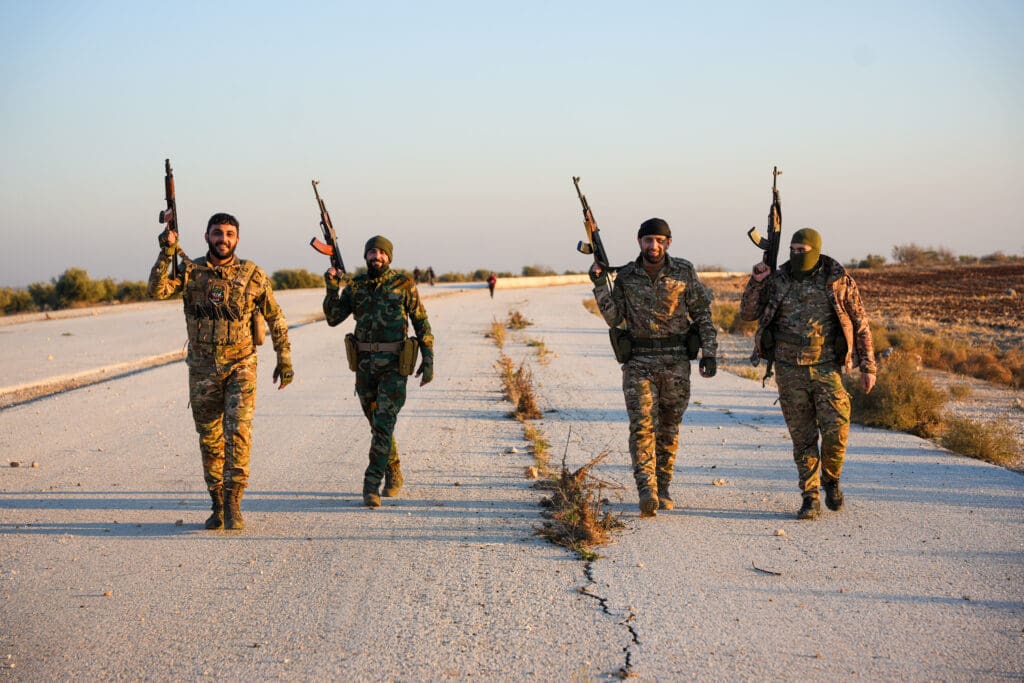The sudden and dramatic developments in northern Syria—beginning in the outskirts of Idlib and surrounding villages near Aleppo and culminating in Syria’s second largest city falling into rebel hands—have thrust Türkiye—widely seen as the closest external power to the rebel factions—into a spotlight it neither sought nor fully avoided.
The speed and ease with which the associated fighters, led by Hayat Tahrir al-Sham (HTS), moved out of their Idlib stronghold to capture Aleppo and push further toward the city of Hama in just three days was extraordinary. This was not merely a tactical success—it struck a critical blow to the economic and logistical infrastructure of President Bashar al-Assad’s regime. The M5 highway, now under the control of HTS, is a vital artery linking Aleppo to Damascus and other regime-held areas. Its loss represents a significant setback for al-Assad’s already fragile economy.
These developments are a turning point, reshaping the balance of power in northern Syria and marking a new phase in the protracted conflict that began in 2011. Yet HTS’ dominant position within the rebel forces complicates the outlook for parties otherwise cheering on their advance against the Assad regime.
The group, which traces its origins to Al-Qaeda, has long been designated as a terrorist organization by Türkiye, the UN Security Council, the United States and Russia. HTS has attempted to rebrand itself as an actor that the world can work with, mainly by severing ties with transnational jihadist networks, implementing internal reforms and restricting the activities of foreign militants in north-western Syria. However, questions persist regarding its governance capacity and ability manage newly captured territories without alienating local populations.
HTS occupies a unique position as a group that is nobody’s official ally but everyone’s tolerated nuisance. Still, the rebel group has not established a direct affiliation with the Turkish state, even though it relies on Türkiye allowing the flow of resources and humanitarian aid into Idlib province.
As such, Ankara has remained quiet on the extent of its involvement in the offensive, but it may have had advanced knowledge due to the involvement of the Syrian National Army (SNA), which opeates under the aegis of Türkiye. It is plausible that Ankara did not expect the rebels to rout the regime so thoroughly; nonetheless Türkiye’s interests have been well-served by the groups’ ongoing military advancement.
This relationship is difficult for Ankara to explain domestically due to the societal and historical trauma surrounding jihadist movements, both within Türkiye and globally. Yet beyond permitting aid flows, the arrangement includes logistical allowances, intelligence-sharing via Turkish observation posts, and maintaining a status quo in the region. The relationship between Türkiye and HTS can best be described as one of aligned interests; Türkiye avoids direct engagement with HTS but ensures they do not obstruct each other’s objectives. Simultaneously, HTS independently coordinates with foreign governments and aid missions run by the United Nations.
Ankara’s Interests
Turkish President Recep Tayyip Erdogan’s government views the recent game-changing developments through both regional and domestic lenses. For Türkiye, Syria is not merely a foreign policy concern but is deeply intertwined with domestic priorities. By backing opposition groups, Ankara is able to pressure Assad while simultaneously advancing its domestic agenda.
For example, the large Syrian refugee population in Türkiye has become a political lightning rod, with public demand for their repatriation growing. As such, Ankara’s drive to create safe zones, now including Aleppo, is motivated in part by the fact that approximately 42% of Syrians currently living in Türkiye are from the Aleppo region. This effort is as much about facilitating “voluntary” refugee return as it is about addressing rising public discontent over their presence in Türkiye.
Similarily, Türkiye’s presence and activities in northern Syria are largely focused on countering Kurdish territorial ambitions—an issue that has considerable overlap with Kurdish militancy inside Türkiye. Indeed, Ankara views the large swathe of Syrian territory controlled by the U.S.-sponsored and Kurdish-led Syrian Democratic Forces (SDF) as a front for the Syrian Democratic Union (PYD) and People’s Defense Units (YPG)—the Syrian affiliates of the militant Kurdistan Workers’ Party (PKK) that it is determined to defeat.
Türkiye’s Patience Is Wearing Thin
Ankara’s frustration with Assad’s rigidity has also shaped its stance. For years, Türkiye has called for meaningful dialogue with the Syrian regime to resolve the conflict. However, Assad’s demands—such as the full withdrawal of Turkish forces and an end to support for the opposition—are viewed in Ankara as unrealistic. Despite adhering to these demands, the regime’s economic and military position is fragile, especially with its vital allies Iran and Russia also overstretched and weakened. Assad’s refusal to meaningfully engage with Türkiye, despite repeated overtures from Ankara, now appears to have been based on an overestimation of his position.
For Iran, Aleppo’s loss is a particularly bitter pill. Tehran has invested heavily in Assad’s survival: deploying Hezbollah, reshaping demographics and building a land corridor connecting Syria and Iraq to Lebanon. The potential severing of this corridor would be a strategic disaster for Iran, further isolating it in the region. Unlike in 2016, when Iran could mobilize militias from Iraq and elsewhere to bolster the Syrian regime, the Islamic Republic’s already overstretched position could make such a response more difficult today.
Accordingly, Iranian Foreign Minister Abbas Araghchi rushed to Ankara two days after Aleppo’s fall. This visit followed directly after consultations in Damascus. Araghchi emphasized the importance of cooperation between Tehran and Ankara to ensure stability and security in the region, despite their support for opposing sides. Following the diplomatic exchanges, Iranian officials accused Türkiye of supporting the “terrorists,” which Ankara and others views as ironic. Behind closed doors, Iran likely asked Ankara to leverage its influence over HTS to stop further advances. But there is no reason to believe Ankara would heed this request, or that it is able to influence such decisions.
The Aleppo operation also exposes the fragility of the current regional order. The Arab League’s cautious embrace of al-Assad, driven by a desire for stability, now faces new challenges. Türkiye’s assertive actions could disrupt these normalization efforts, forcing Arab states to reassess their positions.
Meanwhile, Western countries—while cautious of HTS’ rise and Türkiye’s influence—have not openly blamed Ankara and seem generally satisfied with the outcome in Aleppo. However, taking this as a win for Türkiye is premature. In other instances, assertive Türkish foreign policy decisions, such as implementing the open-door policy for Syrian refugees to enter its border in the early stages of Syrian civil war, have prompted unexpected blowback. Notably, in the wake of the Aleppo takeover, HTS has attempted to appeal to the international community by indicating a willingness to transfer Aleppo’s governance to a transitional body; withdraw armed groups from civilian areas to facilitate civil administration; and respect sectarian diversity. Türkiye’s relationship with HTS may evolve should the group gain broader acceptance within the international community.
Looking ahead, the conflict’s trajectory hinges on several factors. Russia’s role remains a significant wild card. Will Moscow reassert itself in Syria, or will it cede more space to Türkiye and opposition forces? Iran, too, must decide whether to prioritize Syria or continue to focus to other areas like Lebanon and Iraq.
Ultimately, the Aleppo takeover encapsulates Syria’s defining characteristic: a fragile balance where any gains are uncertain and shaped by the unpredictable interplay of local, regional and international forces. For now, the opposition is advancing, Assad is retreating and everyone else is recalculating. If Türkiye’s goal was to remind the region of its clout, it is safe to say “mission accomplished.” The question is, for how long? For all parties, the outcome of this offensive will shape the next chapter of the Syrian conflict—but it leaves no guarantees for stability.


